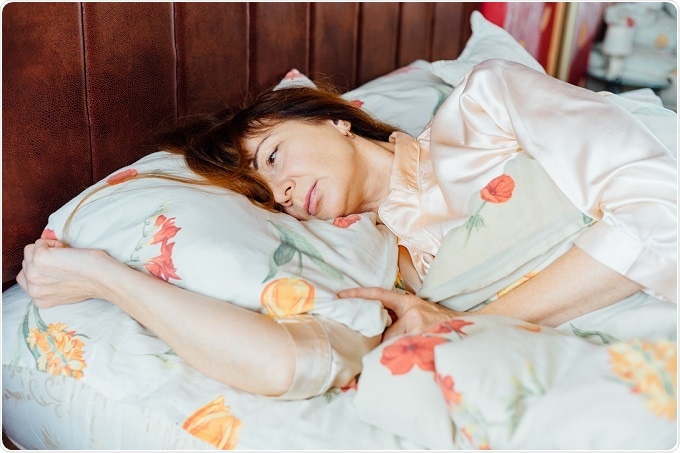A recent survey of peri- and post-menopausal women in the US has highlighted the negative impact that the menopause can have on a woman's ability to get sufficient sleep.
 Credit: Iryna Inshyna/Shutterstock.com
Credit: Iryna Inshyna/Shutterstock.com
It is well know that sleep duration and quality are important for maintaining good health and wellbeing. Health recommendations stipulate that adults aged 18–60 years should sleep for at least 7 hours per night to optimize health and performance. In particular, it has been shown that poor sleeping habits can increase the risk of heart disease, high blood pressure, diabetes and mental distress.
Changes in the levels of reproductive hormones, such as the cessation of oestrogen production during the menopause, increase the risk of sleep problems. To evaluate the extent of the impact the menopause has on sleep patterns, data collected in the 2015 US National Health Interview Survey (NHIS) for non-pregnant women aged 40–59 years were analyzed. The results presented are thus representative of the civilian, non-institutionalized non-pregnant female population aged 40–59 years living in households across the United States.
Women were classed as being post-menopausal if they had not had a menstrual cycle for more than 1 year or their ovaries had been surgically removed. Women were said to be peri-menopausal if they no longer menstruated and their last menstrual cycle was up to 1 year ago. Women were pre-menopausal if they still had a menstrual cycle. Using these criteria, 74% of t he women included in the analysis were pre-menopausal, 3.7% were peri-menopausal, and 22% were post-menopausal.
Sleeping for less than 7 hours per night was most common among peri-menopausal women (56.0%) compared with pre-menopausal (32.5%) and post-menopausal (40.5%) women. However, post-menopausal women were most likely to have poor-quality sleep. Post-menopausal were nearly twice as likely to have difficulty falling asleep compared with pre-menopausal women (27.1% versus 16.8%, respectively).
Over half of post-menopausal women reported waking up not feeling well rested on four or more occasions in the past week. More than a quarter had found it difficult to fall asleep and more than a third did not stay asleep on four or more occasions in the past week.
The authors concluded that although sleep patterns do change with ageing, sleep duration and quality are also influenced by changes in levels of reproductive hormones during the menopause. The critical role of sleep for lowering the risk of chronic diseases means that we should focus more attention on helping peri- and post-menopausal women get adequate sleep.